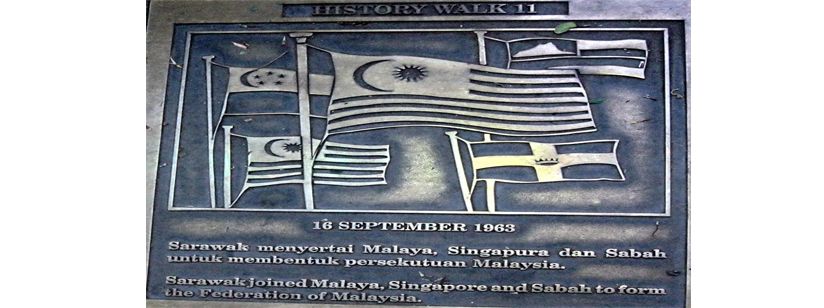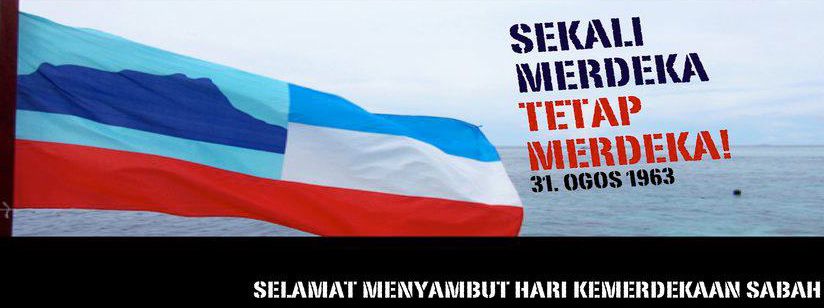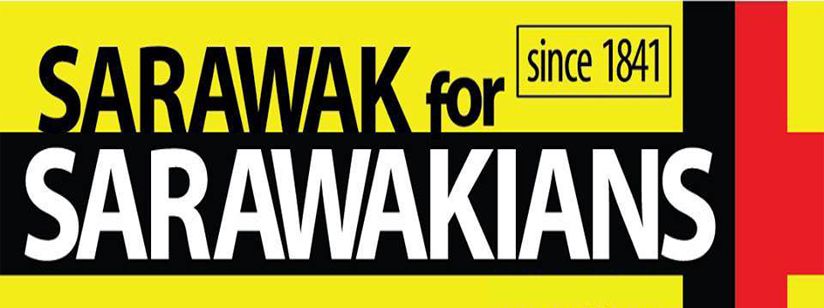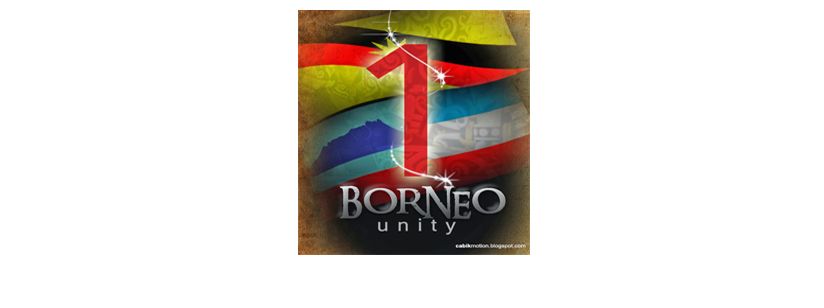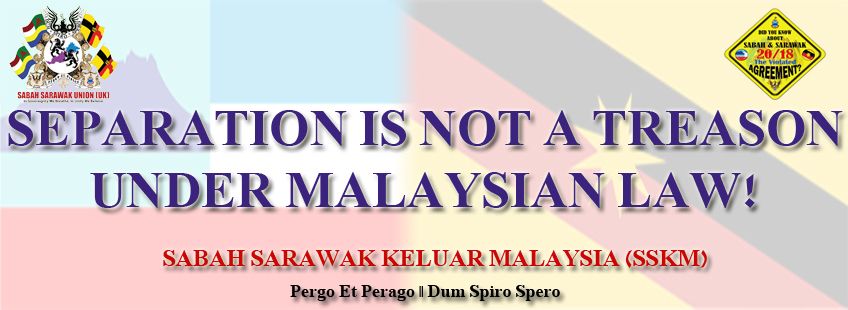Thursday, 17 May 2012
Educations in Sarawak under 18 Points Agreement
Bian said dispite 50 years independence, Sarawak has little to celebrate in relation to its ties with the Federation of Malaysia. He said the rights of Sarawak has stated in the 18-Points Agreement have been "slowly and insidiously eroded without anyone realizing it. In this regard, it is time we take heed of what is rightfully ours". He said drawing attention to several points under the 18-Points for the state government to look into.
S’wak must take ownership of education | Free Malaysia Today
“Even the Education Minister (Muhyiddin Yassin) is not sure exactly how good or bad the educational system is. “In April, he was reported to have claimed that Malaysia’s education is ‘one of the best in the world and that it is better than that being provided in the United States, Germany and also the United Kingdom’.
“However, in (last) Sunday’s papers, he was reported to have said that the government’s 10 to 15-year target to achieve an education system on par with, or better than those of developed countries, was realistic.
Bian said despite 50 years of independence, Sarawak had little to celebrate in relation to its ties with the Federation of Malaysia. He said the rights of Sarawak as stated in the 18-points agreement have been “slowly and insidiously eroded without anyone realizing it. “In this regard it is time we take heed of what is rightfully ours,” he said drawing attention to several points under the 18-Points Agreement for the state government to look into.
SAFODA (Sabah Forest Depaartment) rampas tanah kami!!!
This is our only Home and our only Land. Please give back to us, the people of Sabah Native.
(Inilah sahaja RUMAH kami, TANAH kami. Berikan kembali hak milik kami sebagai Anak Pribumi Sabah )
Musa Aman (Sabah Chief Minister) and Taib Mahmud (Sarawak Chief Minister)
What do they ever care about Sabah and Sarawak, respectively ? This 2 Nations of people are struggling ; till we are on the poorest land. This is supposed to be democracy but we are not treated as in democracy government. Our daily life are being torture, specially people of interior places. Mentally torture have been going on for years in Sabah and Sarawak. No equality and human rights protected.
To know Penan tribe in Sarawak
 Traditional Penan society is nomadic and survives by hunting and gathering. Only a handful of such societies remain on earth. The nomadic hunting-gathering lifestyle represents the original human condition, and was the way our own ancestors lived for millions of years.
Traditional Penan society is nomadic and survives by hunting and gathering. Only a handful of such societies remain on earth. The nomadic hunting-gathering lifestyle represents the original human condition, and was the way our own ancestors lived for millions of years.
Until a few decades ago, thousands of Penan wandered through the forests of Borneo's interior. Today, only a small number of them continue to practice this ancient lifestyle. Yet while most Penan now have permanent homes by the riversides, they continue to make long journeys into the forest to collect food, medicine, and other jungle products. The physical and spiritual well-being of all Penan, whether nomadic or settled, depends on the survival of the forest.
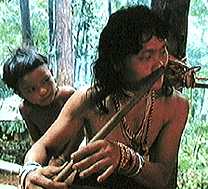 The Penan, like other nomadic hunter-gatherers, enjoy an egalitarian society. There are no social classes or hierarchies. There is no wealth or poverty, and all food is shared. Each band has a headman who acts as a spokesperson but wields no power. Although certain tasks are reserved for men and others for women, there is no obvious sexual inequality, and neither sex exercises coercion over the other. Both men and women are gentle and soft-spoken. Outsiders who observe them are invariably struck by the complete absence of violence among the Penan.
The Penan, like other nomadic hunter-gatherers, enjoy an egalitarian society. There are no social classes or hierarchies. There is no wealth or poverty, and all food is shared. Each band has a headman who acts as a spokesperson but wields no power. Although certain tasks are reserved for men and others for women, there is no obvious sexual inequality, and neither sex exercises coercion over the other. Both men and women are gentle and soft-spoken. Outsiders who observe them are invariably struck by the complete absence of violence among the Penan.Early History of North Borneo
Not much is known of Sabah's early prehistory. Archeological finds are rare but it must be presumed that as early as 40,000 years ago modern man has already roamed the jungles of North Borneo.
By the 9th century AD., Sabah, then under various chieftains, traded with China and later the Spanish and Portuguese. During the 15th century,
The Sultans of Brunei and Sulu exercised a nominal control over north Borneo, especially the coasts, while headhunters roamed the forests and pirates infested the seas. The headhunters were Kadazandusun, as well as Murut tribesmen, and of the two the Kadazandusun were the first to give up headhunting. The pirates were Illanun, Iranum, Balanini, Obian, Bajau and Suluk living in the Southern Philippines and on islands off the coast of North Borneo. Their vessels were of large size, mostly out-triggered, measuring approximately ninety feet long and heavily armed. In Sabah, their strongest lairs were in Marudu Bay and the Tunku Island near present day Kota Kinabalu.
By the 9th century AD., Sabah, then under various chieftains, traded with China and later the Spanish and Portuguese. During the 15th century,
Sabah was a vassal of the Sultan of Brunei. In 1521, Ferdinand Magellan’s ships sailed into Brunei Bay and later repaired their vessels in Banggi and Balambangan islands in the very north of Sabah. In 1704, the Sultan of Brunei ceded the lands east of Marudu Bay to the Sultan of Sulu, while the west coast remained under his rule.
The Sultans of Brunei and Sulu exercised a nominal control over north Borneo, especially the coasts, while headhunters roamed the forests and pirates infested the seas. The headhunters were Kadazandusun, as well as Murut tribesmen, and of the two the Kadazandusun were the first to give up headhunting. The pirates were Illanun, Iranum, Balanini, Obian, Bajau and Suluk living in the Southern Philippines and on islands off the coast of North Borneo. Their vessels were of large size, mostly out-triggered, measuring approximately ninety feet long and heavily armed. In Sabah, their strongest lairs were in Marudu Bay and the Tunku Island near present day Kota Kinabalu.
In 1685 the first Englishman visited Sabah. It was Captain Cowley, and he visited the islands on the northern end of Borneo (Banggi, Balambangan).
In the 1760’s Alexander Dalrymple and James Rennell came to Borneo and mentioned Sabah.
In 1773 the East India Company founded a trading post on Balambangan Island, but two years later the settlement was attacked and destroyed by pirates.
It was not until Raja Brooke of Sarawak, with his personal contacts to the Sultan of Brunei, persuaded the Government to suppress piracy and in 1846 the Sultan of Brunei ceded Labuan Island off Sabah's south-west coast to serve as a base for the anti-piracy operations of the British. The last pirate stronghold in Sabah, at Tunku Islands, was destroyed in 1879.
In the 1760’s Alexander Dalrymple and James Rennell came to Borneo and mentioned Sabah.
In 1773 the East India Company founded a trading post on Balambangan Island, but two years later the settlement was attacked and destroyed by pirates.
It was not until Raja Brooke of Sarawak, with his personal contacts to the Sultan of Brunei, persuaded the Government to suppress piracy and in 1846 the Sultan of Brunei ceded Labuan Island off Sabah's south-west coast to serve as a base for the anti-piracy operations of the British. The last pirate stronghold in Sabah, at Tunku Islands, was destroyed in 1879.
Sino - Kadazan.
From Late Latin Sinae (“‘the Chinese’”), from Ancient Greek Σινάι, from Arabic الصين (aʂ-ʂīn), “‘China, the Chinese’”), from Mandarin اط (qيn) in اط³¯ (qيn chلo), “‘Chin Dynasty’”).
Sino-
1. A combining form relating to China or the Chinese.
In the 1970s, Sino-Soviet rivalry also spread to Africa and the Middle East.
He's a Sino-Kadazan: half Chinese, half Kadazan.
The Kadazans are an ethnic group indigenous to the state of Sabah in Malaysia. They are found mainly on the west coast of Sabah, the surrounding locales, and various locations in the interior. Due to similarities in culture and language with the Dusun ethnic group, and also because of other political initiatives, a new unified term called "Kadazan-dusun" was created. Collectively, they form largest ethnic group Sabah.
While Kadazan was an official designation for this ethnic group, it is widely believed that the term itself was a political derivative that came into existence in the late 1950s to early 1960s. No proper historical record exists pertaining to the origins of the term or its originator. However, an article written by Richard Tunggolou[1] on this matter may shed some light.
According to Mr. Tunggolou, most of the explanations of the meanings and origins of the word ‘Kadazan’ assumed that the word was of recent origin, specifically in the late 1950’s and early 1960’s. He says that some people have theorized that the term originates from the word ‘kakadazan’ (towns) or ‘kedai’ (shops), and from the claim that Kadazan politicians such as the late Datuk Peter J. Mojuntin coined the term. In fact, the word ‘Kadazan’ is not of recent origin. There was evidence that the term has been used long before the 1950s. Owen Rutter, in his book, “The Pagans Of North Borneo”, published in 1929, wrote: “The Dusun usually describes himself generically as a tulun tindal (landsman) or, on the West Coast, particularly at Papar, as a Kadazan.” (page 31). Owen Rutter worked in Sabah for five years as District Officer in all five residencies and left Sabah with the onset of the First World War.
This means that he started working in Sabah from 1910 and left Sabah in 1914. We can therefore safely say that the word ‘Kadazan’ was already in existence before any towns or shops were built in the Penampang district and that Kadazan politicians did not invent the word in the late fifties and early sixties.
